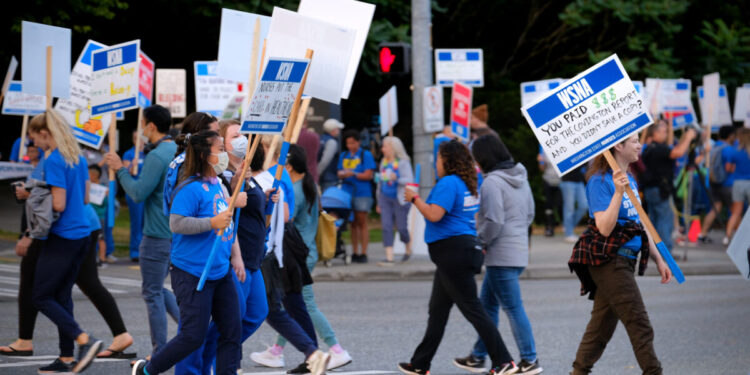King County public health nurses gathered at the Chinook Building in downtown Seattle Saturday afternoon, demanding improved compensation amid stalled contract negotiations that have stretched eight months.
Approximately two dozen nurses assembled at 401 5th Avenue at 2 p.m., organized by the Washington State Nurses Association as union representatives continue negotiations with county officials over wages and working conditions.
“We want the county to value us in a way that aligns with its True North and values,” said Kiesha-Garcia Stubbs, a public health nurse. “Public health nurses hold a unique level of tolerance, but we are done tolerating different treatment than other nurses. We deserve more, and we will not stop fighting until we get it.”
The union provided rally participants with petition QR codes for public support, scheduled speakers, and opportunities to engage with workers about contract issues.
WSNA stated that county nurses are “watching their paychecks stagnate because of broken promises by the county,” arguing that workers “should feel valued and supported for their years served,” according to a September 27 Facebook post.
Recent county proposals addressed union requests for safe and affordable parking at certain locations, including the Goat Hill facility through 2028. However, union representatives said the parking provision came packaged with terms denying nurses increased limits on compensatory time accrual.
The union characterized the parking offer as insufficient compensation for broader contract concerns, including wage growth and benefits that nurses argue have not kept pace with comparable positions in other healthcare settings.
WSNA’s Labor Executive Council held meetings in Richland Friday as negotiations with county leadership continue. The prolonged negotiation period reflects broader tensions between public sector healthcare workers and government employers over compensation structures.
King County public health nurses provide essential services including immunizations, disease surveillance, and community health programs. The union argues their specialized skills warrant compensation comparable to clinical nurses in hospital settings.
County officials have not publicly commented on specific contract proposals or the rally. Budget constraints and competing priorities often complicate public sector labor negotiations, particularly for healthcare positions requiring specialized training.
The nurses’ contract dispute occurs as healthcare worker shortages continue affecting public health departments nationwide, with recruitment and retention challenges driven partly by compensation gaps between public and private sector positions.







